| The 2020 Dennis Wheatley ‘virtual’ Convention |
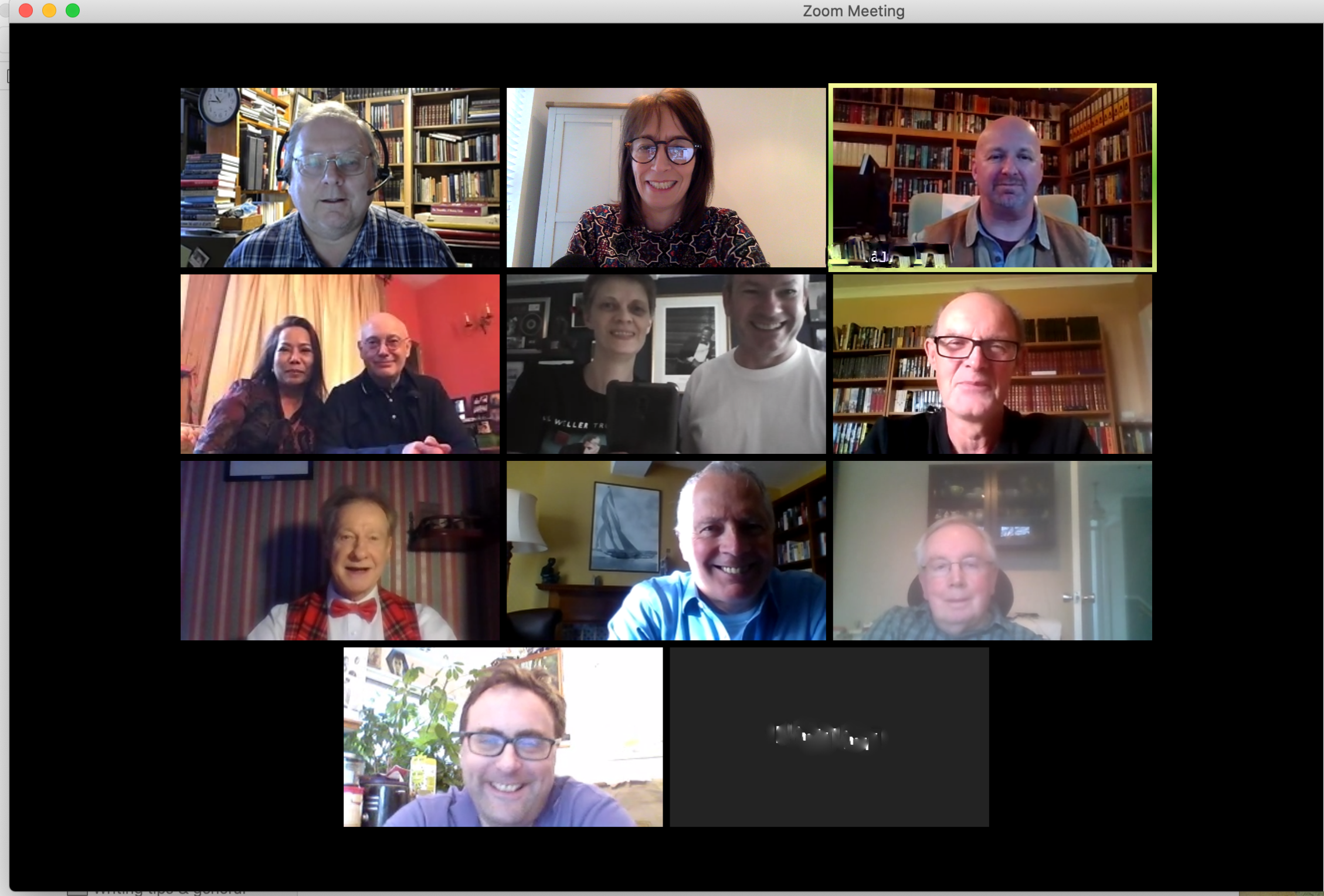
|
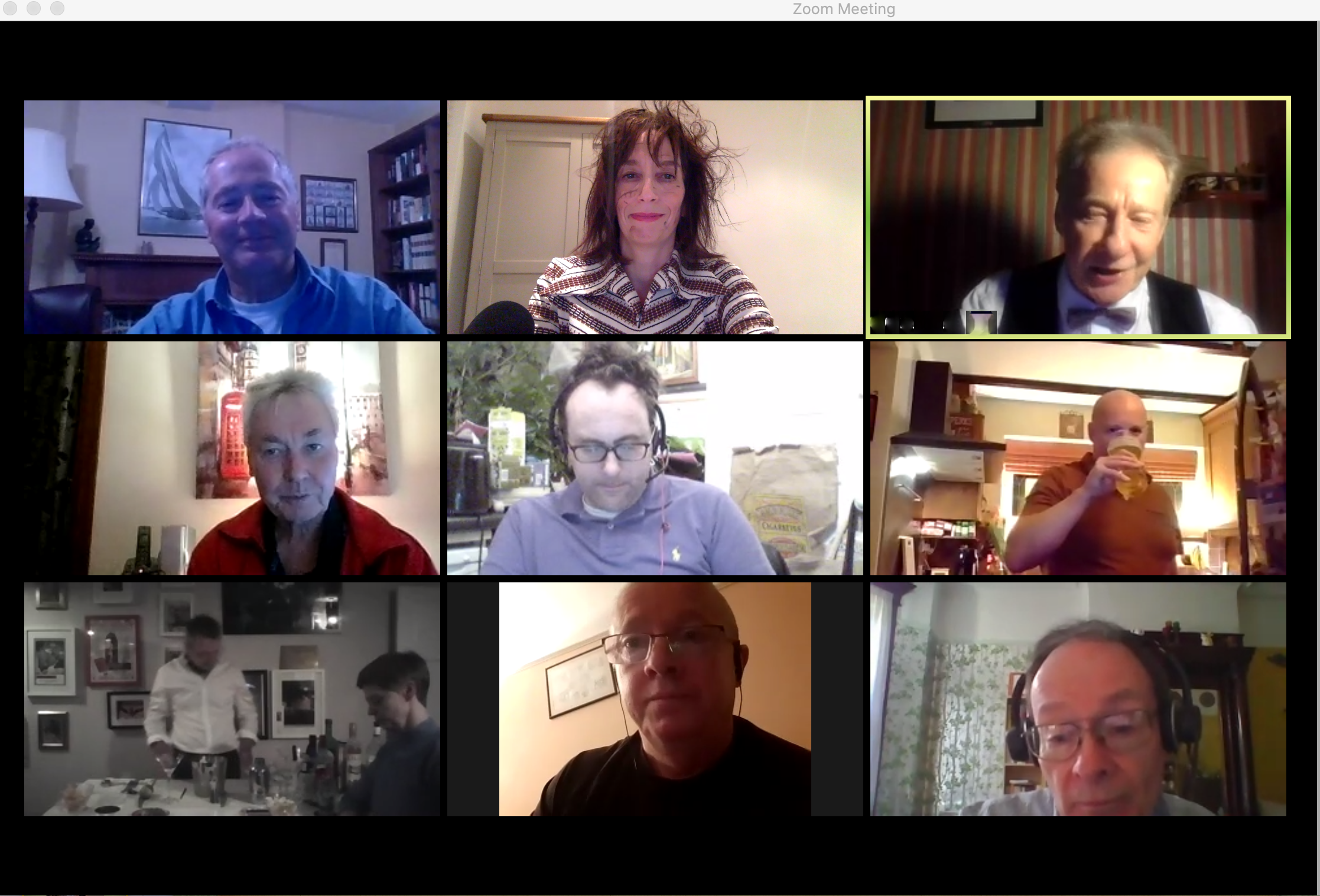
|
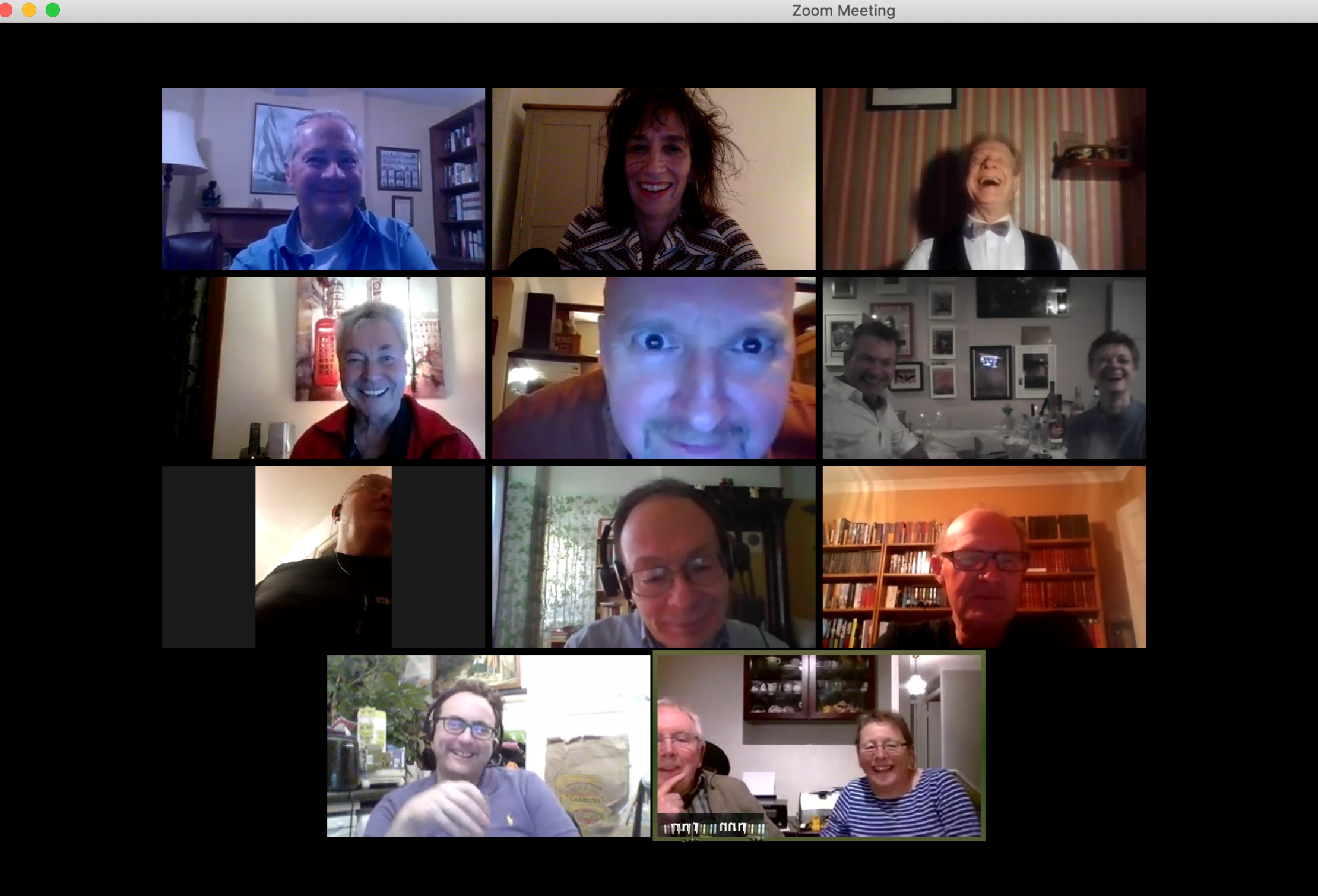
|
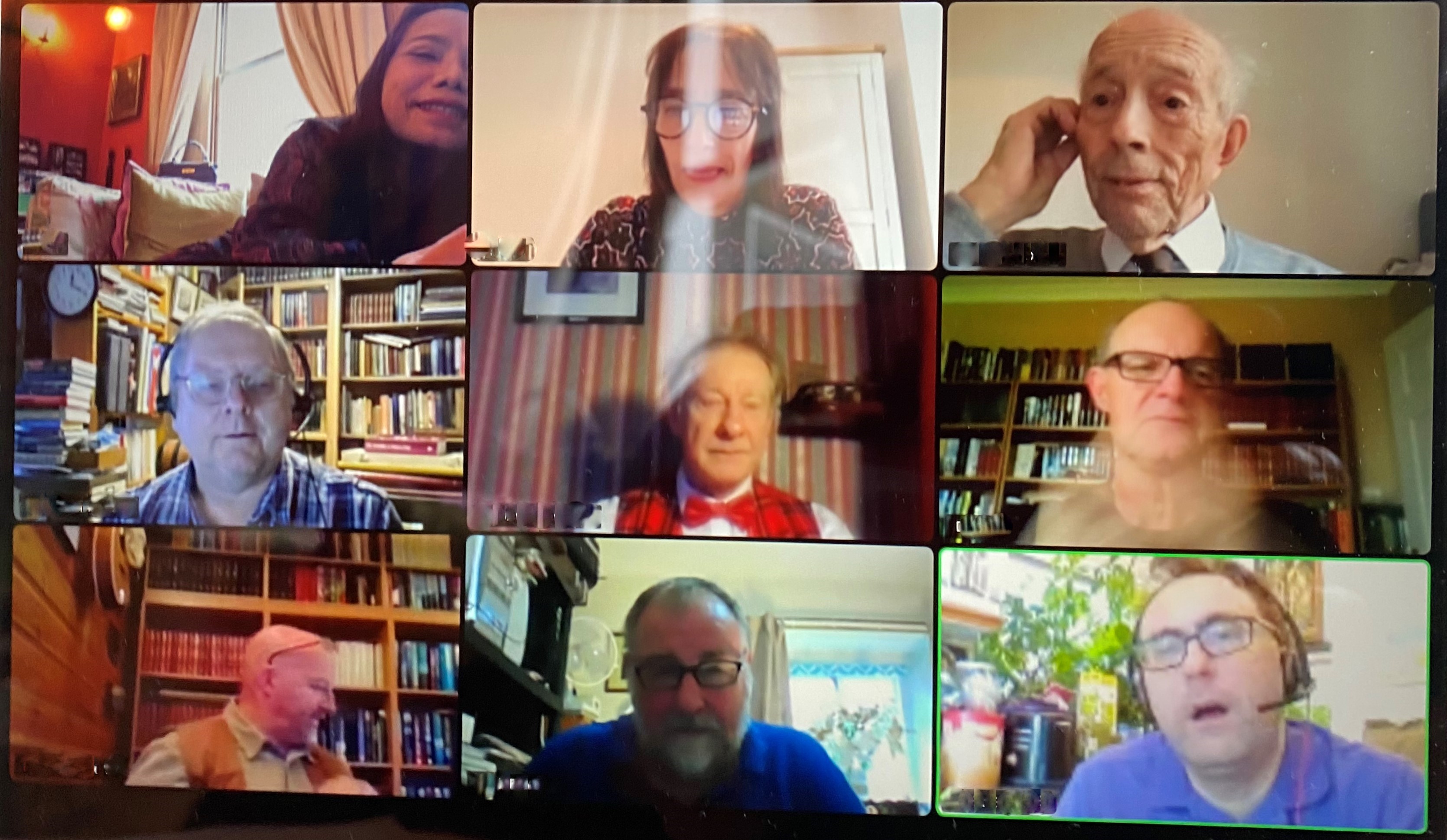
|
|
A selection of screen-shots of the participants |
|
The thirteenth Dennis Wheatley Convention took place on Saturday 31st October, and for the first time ever, and due to Covid, it was held via ‘Zoom’.
‘Old hands’ wondered how it would go, but thanks to the hard work of Anna and Ken G and the other participants it went superbly and everyone had a great time, even though they had to meet on the ether rather than physically for the first time!
The Convention began with Anna, who had also conducted the all-important preliminary ‘rehearsals’, going through the ‘house rules’, which guaranteed a seamless and most enjoyable day.
Ken G then opened the Convention, noting that nothing would stop us having our Conventions, even if our thirteenth was definitely our ‘strangest’ yet!
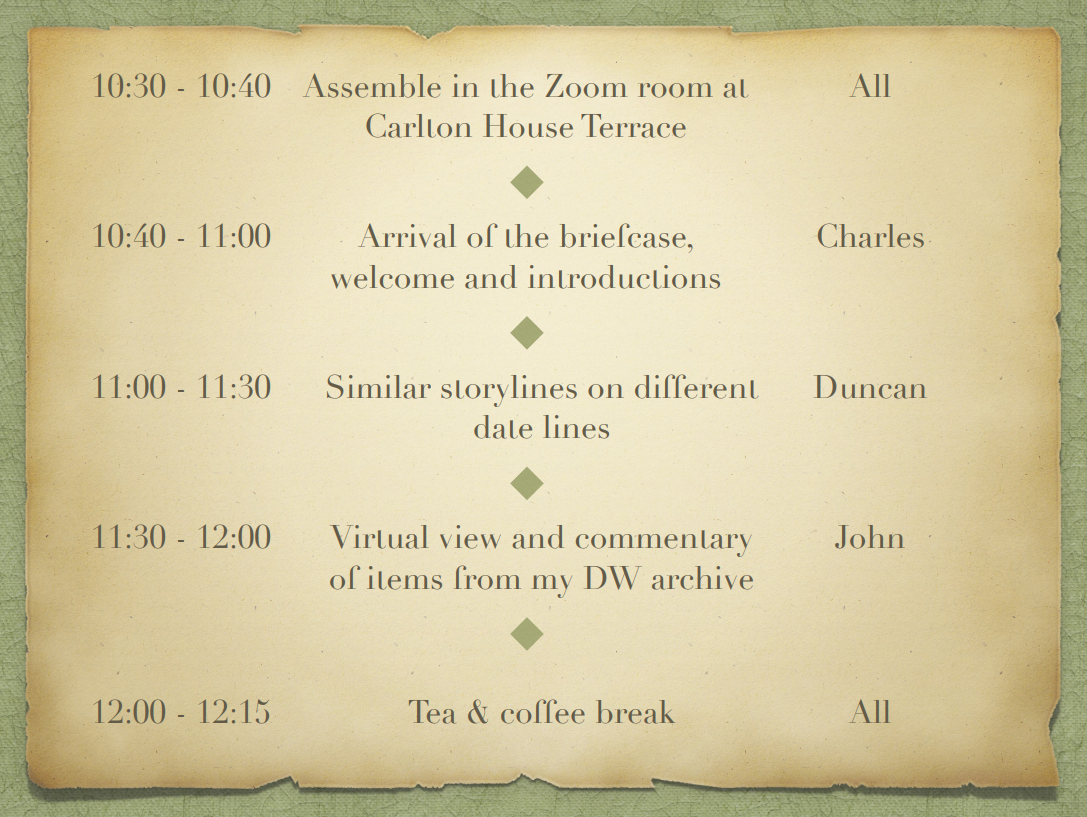
|
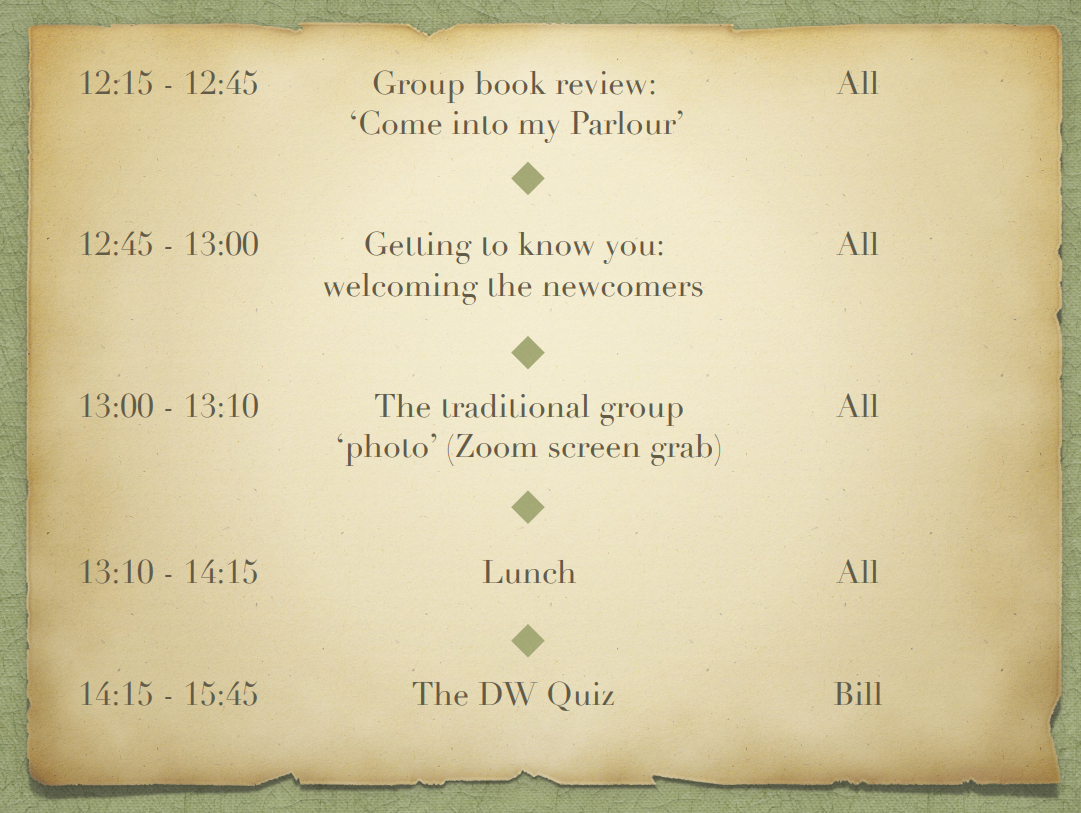
|
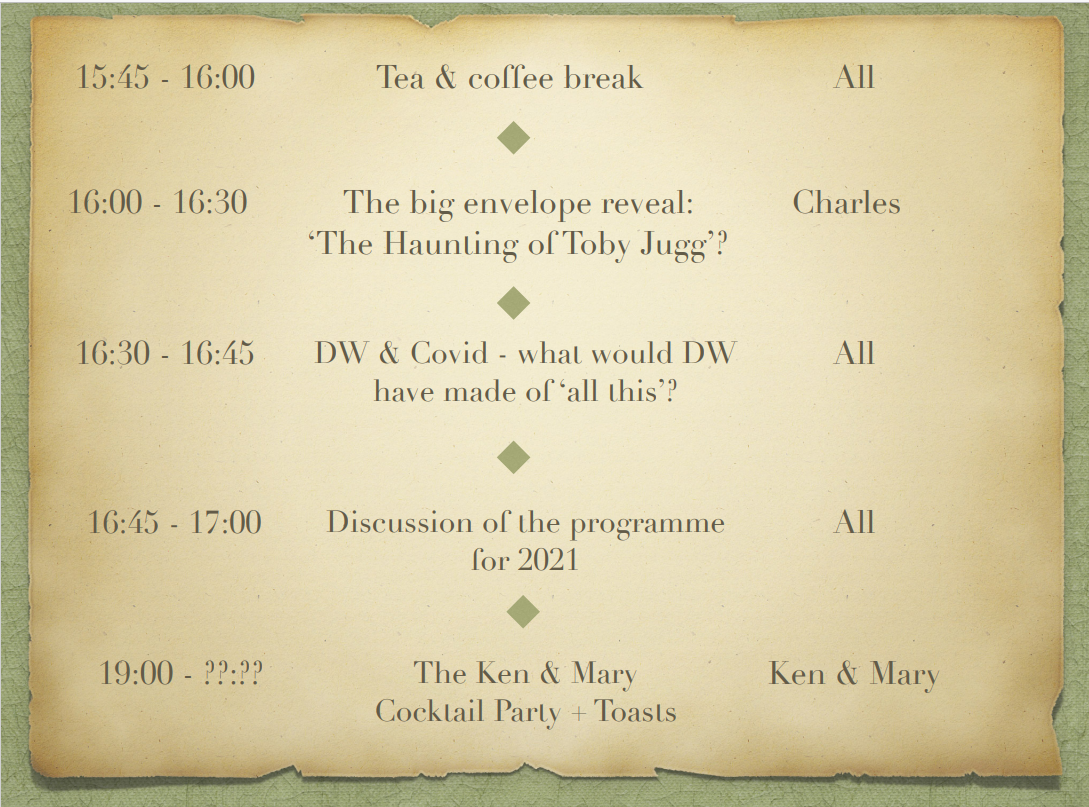
|
|
The Programme |
||
As tradition dictated, Charles then brought in DW’s briefcase, but instead of Steve Whatley’s traditional hand-crafted programmes, this year it contained just a printed-out copy of the electronically circulated programme for the Convention and a copy of Southwark Council’s guidance on what he was, and was not, allowed to do due to Covid. Fortunately, virtual Conventions were very much permitted.
Welcomes and introductions...
We would hear more from them later, but after the general welcomes and welcomes to those who had attended previous Conventions, specific and individual welcomes were extended to this year’s first time attendees – Jonathan M, Robert R and Keith R.
Duncan started the Convention’s first session by musing on the extent to which DW had employed similar storylines when writing stories about his different characters across the ages.
Duncan began by noting DW’s comment (in ‘Drink and Ink’, page 261) that had DW lived in Roger Brook’s age, he would like to have been Roger, and by observing that DW and RB shared the same birthday (8th January), although RB had been born 129 years earlier. Also that he and Roger lived in the same house, the house in which DW wrote his early Roger brook novels in Lymington.
Duncan also observed that some of the heroes knew each other (Sir Pellinore Gwaine-Cust, for example, figures in some of the Duke de Richleau novels). Furthermore, some ‘baddies’ feature in more than one novel – perhaps most notably Lord Gavin Fortescue, who appears in ‘Such Power is Dangerous’ (1933), ‘Contraband’ (1936), and briefly at the beginning of ‘The Quest of Julian Day’ (1939).
There are different characters who fulfil similar roles across the novels as well; for example Gregory Sallust’s manservant Rudd plays in some ways a similar role to Roger Brook’s Dan.
Perhaps in some ways the Duke has a unique place in that he is normally, depending on his age, working alongside his trio of ‘musketeer’ friends.
Elsewhere, and perhaps inevitably, there are characters across-the-novels who play not-dissimilar roles; whatever he does during his adventures, Gregory Sallust always has his long term love for Erika in the same way that Roger Brook has for his Georgina; and they both look up to and receive their instructions from wise men who have their fingers upon the pulse of the goings-on of the times; Roger has William Pitt, while Gregory has Sir Pellinore. And both men have their arch-rivals who they battle across a series of novels in the form of Fouche and Gruppenführer Grauber, who share some similarities themselves. In this respect again, perhaps de Richleau is different. His enemies tend to appear once, and to then be dispatched permanently to the nether regions.
Other participants observed such devices as the use of a shipwreck / hi-jacking appeared in more than one book, and how DW himself appeared in at least one (Traitors’ Gate), and discussed how DW managed to combine fact with fiction, and wondered whether, during construction of the novels, DW had used some kind of a matrix (as he is thought to have done in LCS) to facilitate the blending of the various elements. One in the group, who had recently published their own rather excellent novel, confirmed that she herself had done so, which was extremely interesting.
Duncan concluded a most interesting inter-active sessions by observing that the real life back-drops to DW’s novels also contained similarities – with, for example, both Napoleon and Hitler making ill-fated attempts to conquer Russia.
Duncan was followed by John Runter, who delighted everyone, not least because in the absence of Covid and the Convention being held virtually, his attendance would have been unlikely.
John was of course the only one of us to have met DW ‘in the flesh’, and had done so, memorably, on two occasions. Furthermore, he had been a regular attendee since our second Convention.
John displayed the following, giving each one a fascinating commentary:
John gave us a fascinating session !
There then followed a (self-catering under the circumstances!) tea and coffee break, during which Mary G showed us the latest additions to her ‘Dennis Wheatley wall’ which records all the various things that we have done and heard about during our various Conventions. As every year goes by, it looks more and more impressive!
After the break, the Group tried a novel type of book review a group book review, where we all read the same novel (in this case, the Gregory Sallust novel ‘Come Into My Parlour’), and compared our thoughts on it.
Jonathan M. kicked off by saying that in his view there were really two books – one about Erika and her husband, and the other about Gregory’s investigations in Russia. Jonathan’s thesis was reinforced by Keith R., who said that he had read the book several decades ago, and had remembered the bits with Erika, but forgotten the Russian element altogether until he re-read it !
In an earlier review, Steve Patton (not present at this Convention) had observed that the sequence where Erika fell through trees as she leapt out of a window to escape the Nazis was one of DW’s finest pieces of descriptive writing, and Anna pointed out that in many ways it was a love story. Comment was made that divorce was a much more serious matter in those days, and this would have made the main theme of the book appear even more true-to-life than it does to modern readers. The ‘fairy tale nature’ of the castle was brought out by Ken G, and various other observations were made, all but one of which I must leave out of this account to prevent it becoming over-long.
That one account came from Darren, who observed that Toby Jugg, who was not to feature in a story until some two years after ‘Come Into My Parlour’ (i.e. in 1948) was probably one of the airmen recovering from his wounds at Gwaine Meads at the start of the story.
While we had given a welcome to our three newcomers at the outset, this slot provided an opportunity for our three newcomers – Jonathan, Keith and Robert – to say something about themselves and what they thought of everything so far. Everyone was delighted that they all clearly felt at home, and were fully joining in the proceedings.
Before lunch we had the traditional group photo … this time in a slightly different form, and taken by Anna – the results can be seen at the top of the report !
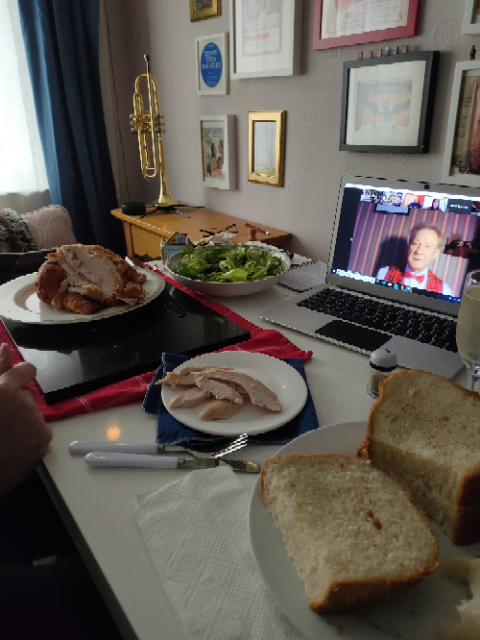
|
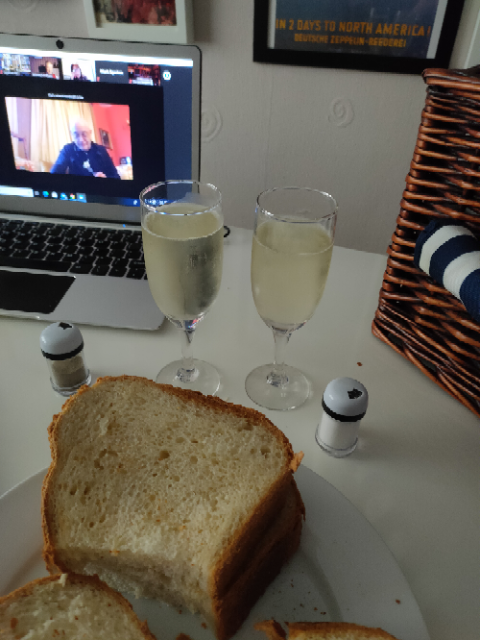
|
|
|
A lucky couple’s lunch |
||
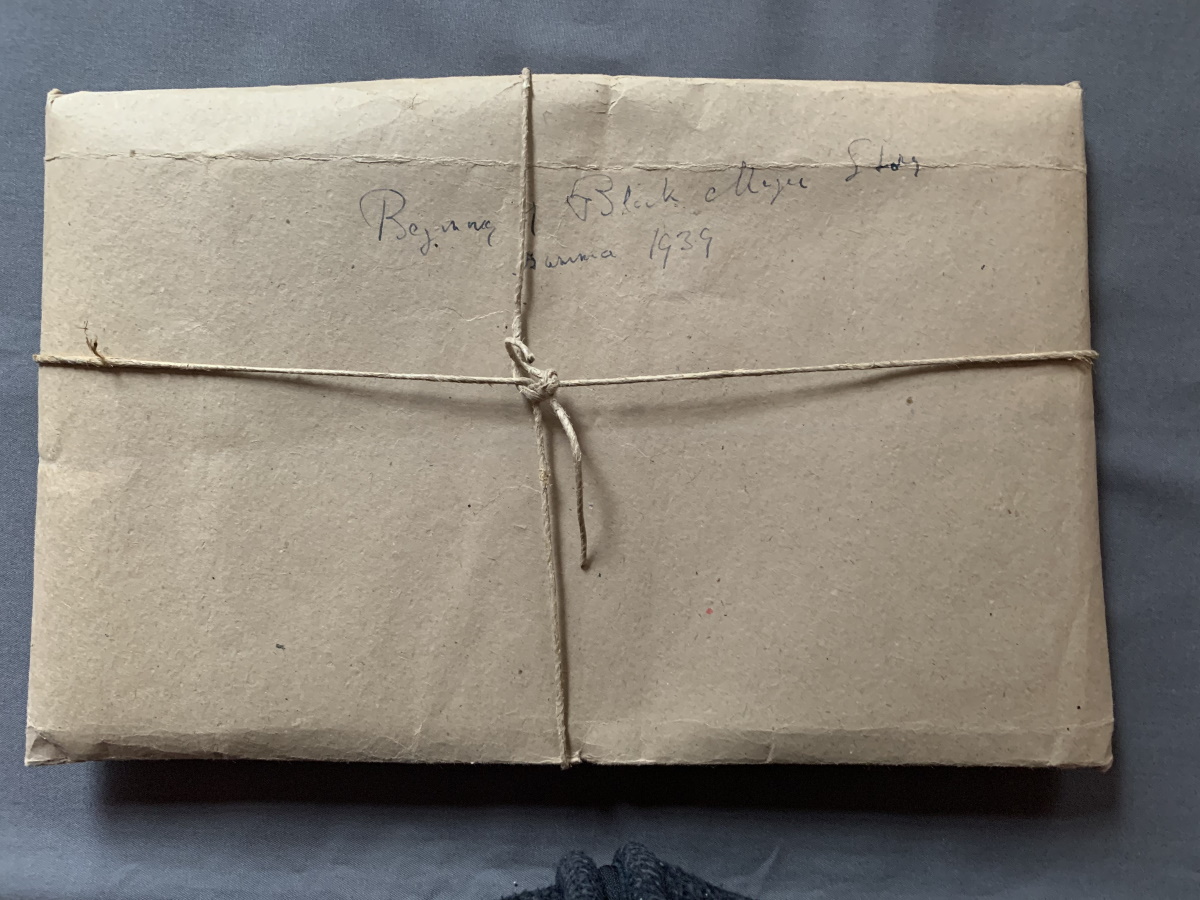
|
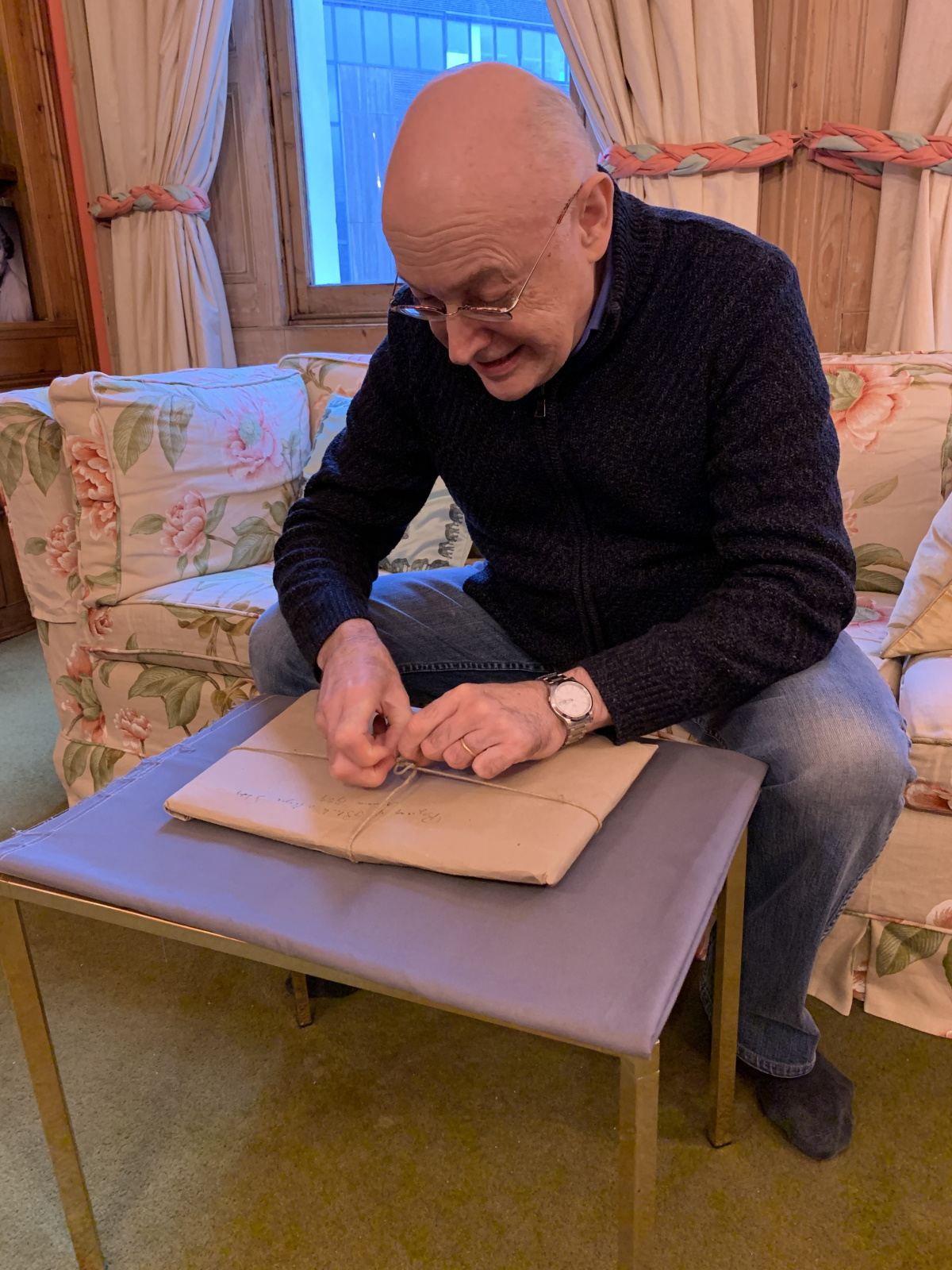
|
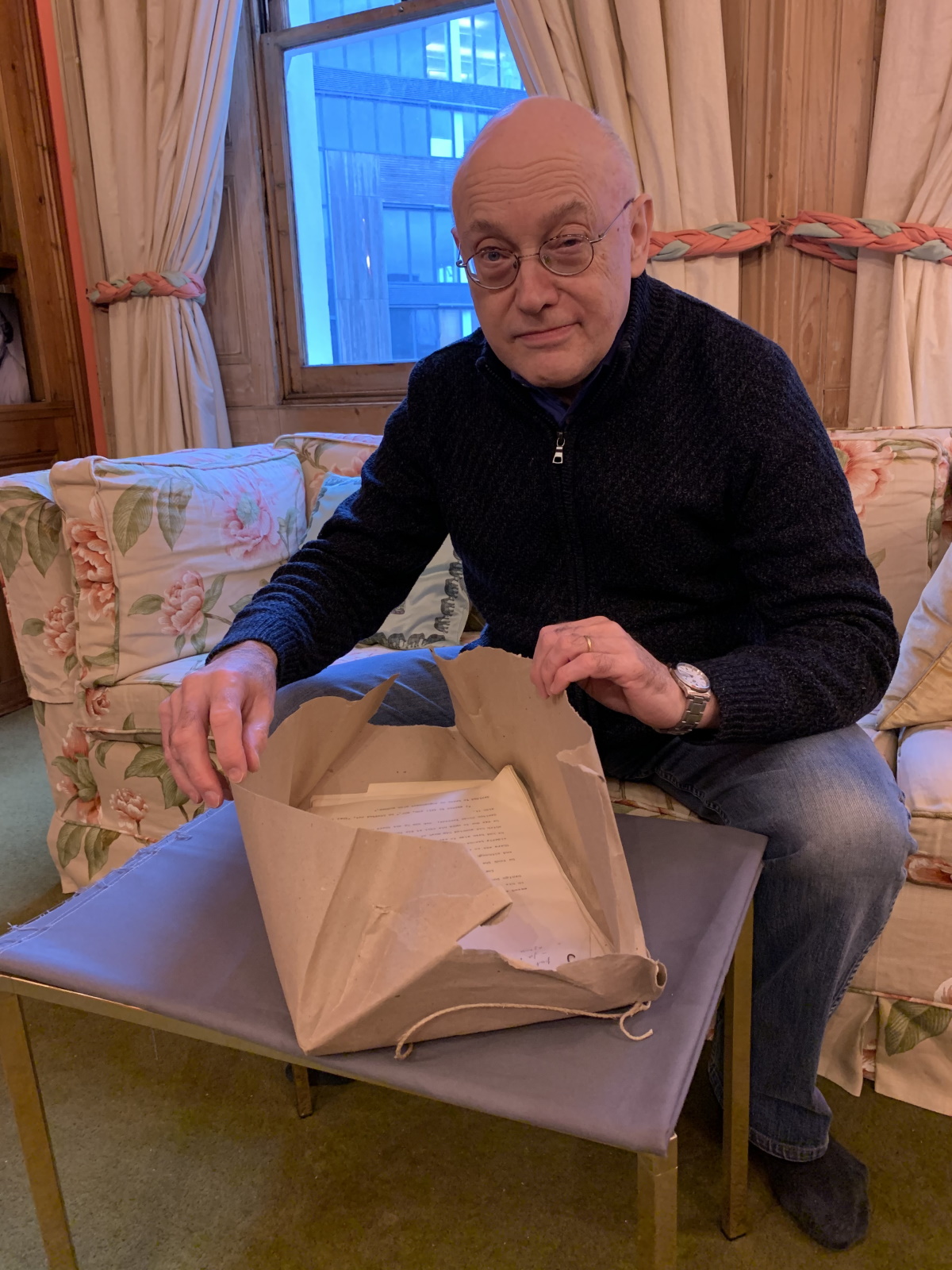
|
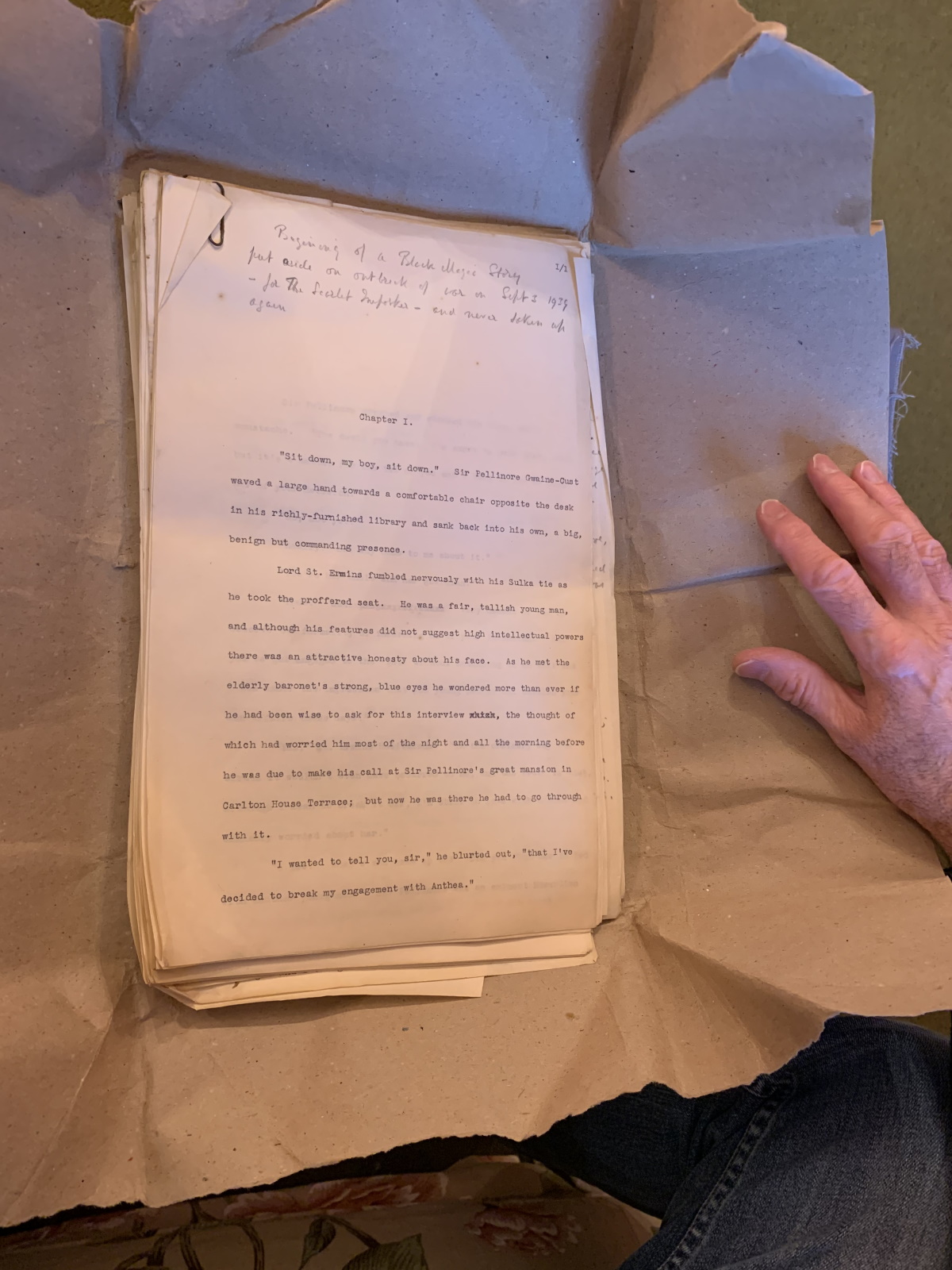
|
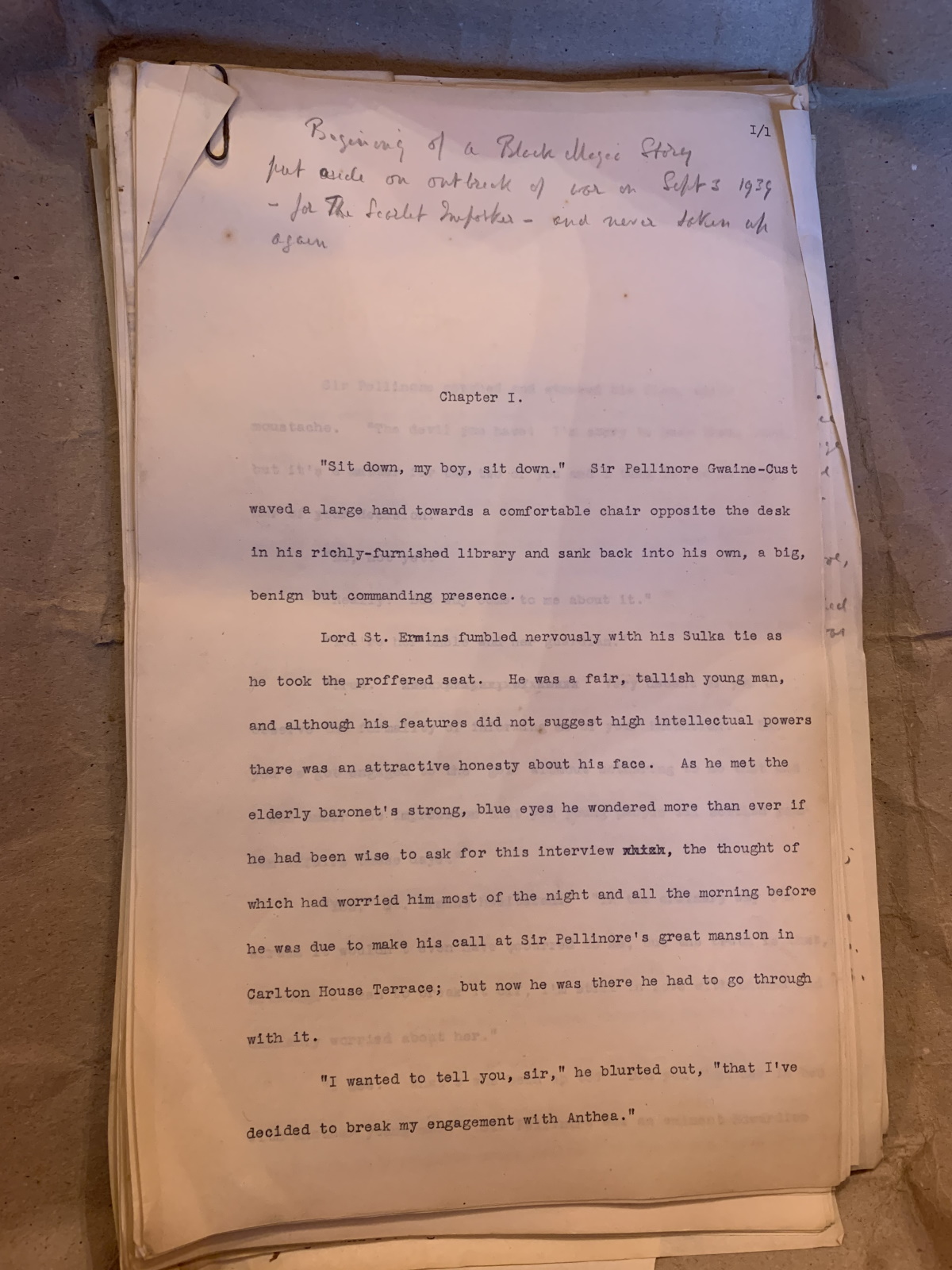
|
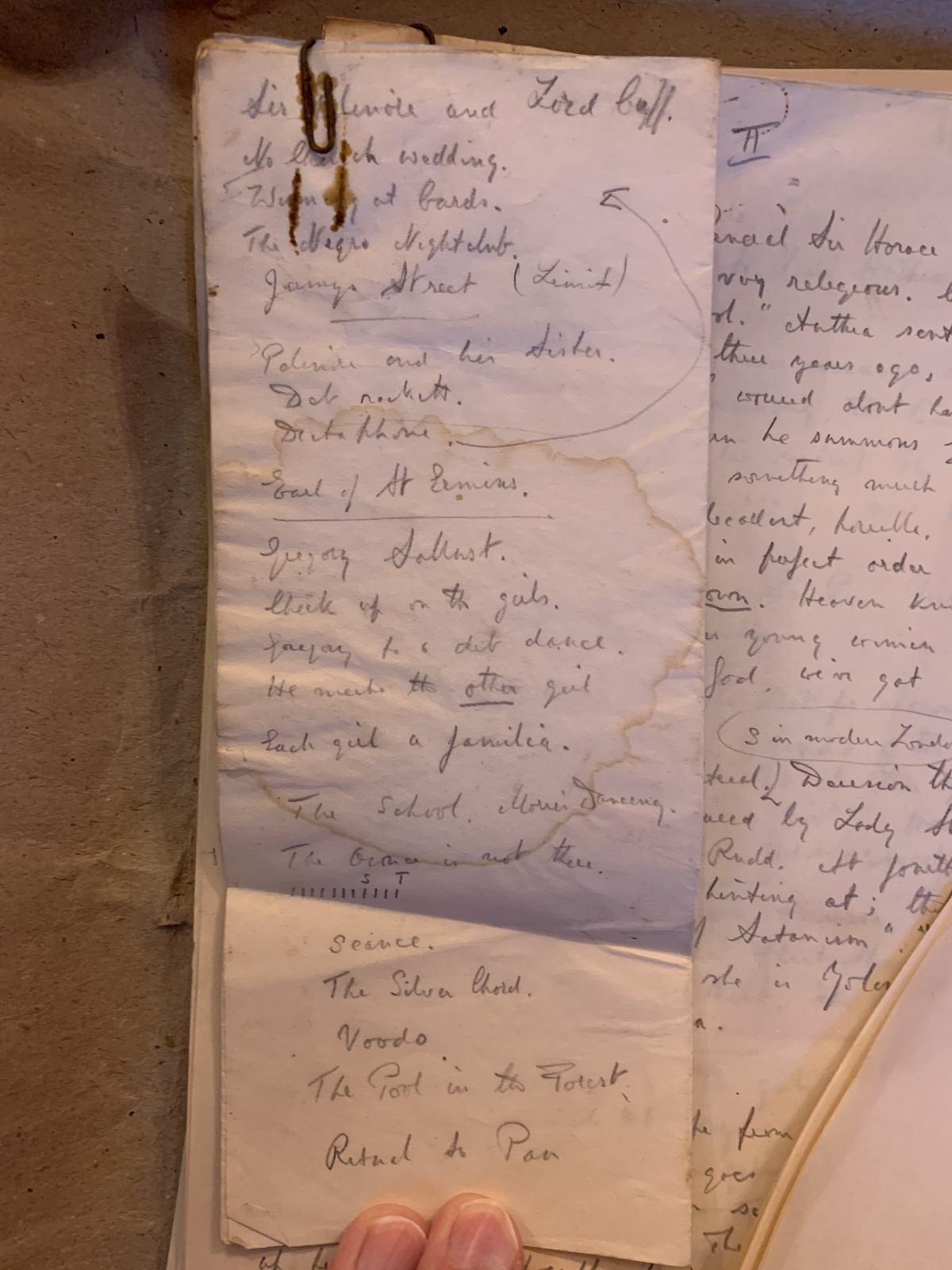
|
|
The big envelope reveal: The precursor to ‘The Haunting of Toby Jugg’ |
||
This year’s ‘big reveal’ took the form of the opening of a packet which had remained un-opened since DW had folded the contents into a parcel he had crafted out of a square of heavy duty brown paper and tied up with some string (and using one of the naval knots he had learned on H M S Worcester).
On the front, DW had written: ‘Beginning of Black Magic Story 1939’.
DW wrote in ‘Drink and Ink’ (in the first paragraphs of Chapter 17) that early in 1939 he had embarked on a Black magic story featuring Gregory Sallust, where Gregory was sent by Sir Pellinore to investigate an ultra-liberal school where the pupils were encouraged to attend Satanic gatherings, but that owing to the outbreak of war, DW switched to writing the war story ‘The Scarlet Impostor’ instead.
DW continued that he never returned to the book, but used the core idea ‘many years later’ (in fact nine years later) as the central theme for his book ‘The Haunting of Toby Jugg’.
Opening these parcels is always a nervous occasion … both because opening something that old and fragile must be done carefully so as to avoid damage, and because none of us knows until they have the benefit of hindsight whether what is inside will be ‘gold’, or a disappointment.
What was inside – although it will have to be studied in depth – was the first three chapters of the missing book in typescript, the handwritten pencil manuscript for these chapters, and some plots notes for what was to follow.¹
Charles read out some random pages, and some excerpts from the handwritten notes. There was a general consensus that what we had before us was a nugget rather than a lump of lead, and the hope is that Charles will be able to get permission for a transcript of what remains of this missing story to appear on the website.
Our next session was deliberately topical – Coronavirus, and what DW would have made of it, and the first observation to be made was that DW lived through its arguably more devastating predecessor – the ‘Spanish Flu’ of 1918-1920.
The general feeling was that, after having lived through that, and having endured two World Wars, serious as the virus is, and awful as every fatality is, he and those of his generation would probably have taken a rather ‘…and life goes on for the survivors …’ attitude to it.
Taking on board the views expressed in his ‘Letter to Posterity’ about the importance of democracy and the pricelessness of individual freedom, there was also a feeling that while DW would probably have respected the rules imposed by Parliament as the Government has a legitimate mandate to govern, DW would probably have had some sympathy with those who decided not to follow what were in essence freedom-limiting guidelines. All his life however, DW had been concerned about the dangers of this country having a revolution of the type that France had gone through in the late 1780s and 1790s, and which ‘we’ had somehow avoided, so even if he found some of the behaviours of the some of the members of the governing party undesirable, he would almost certainly have abided by their edicts.
DW would not however have suffered from any shortage of ‘loo rolls’ or similar. True to his form in the run-up to World War Two, DW would almost certainly have stocked up with every conceivable luxury (and necessity) long before anyone else thought of doing so for Covid … or, for that matter, for Brexit .
To end this session on a more light-hearted note, Bill read out in broad Scottish tones a poem ‘Tae the virus’ by a certain Irene McCullum. It was completely brilliant, and it had us all in stitches.
There was the usual animated and positive discussion about this.
The consensus was that the Group Book Review had been a success, and should be repeated. There was also a wish that Darren would give a talk on his further research into ‘The Haunting of Toby Jugg’, especially if we held the Convention at Dartington Hall, which had been the book’s inspiration. ‘The first DW book we each read’ was suggested as a further theme, and possibly if the data can be found, a talk on the composition of DW’s literary audience. For his part, Jonathan M volunteered to give a talk on DW’s ‘Library of the Occult’, and his offer was eagerly accepted !
There was also a general consensus that, even if we can have a physical Convention next year, we should still if possible have a ‘zoom option’. That way, those who cannot manage the long journey to Devon (if that is where we hold it), or who cannot attend physically for various other reasons (and here John R, and Jim D, who lives in America, came particularly to mind) will still be able to join us remotely. This way with any luck we will be able to keep up our current, and large by historic standards, numbers.
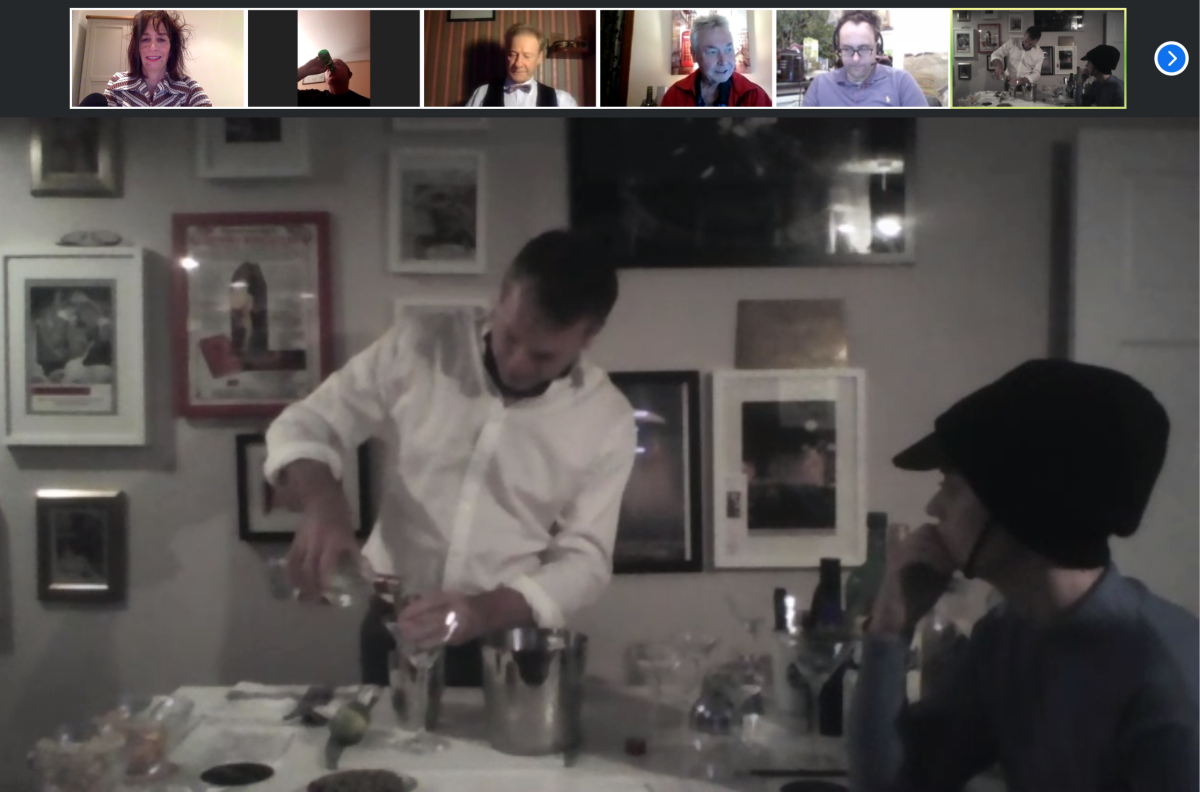
|

|
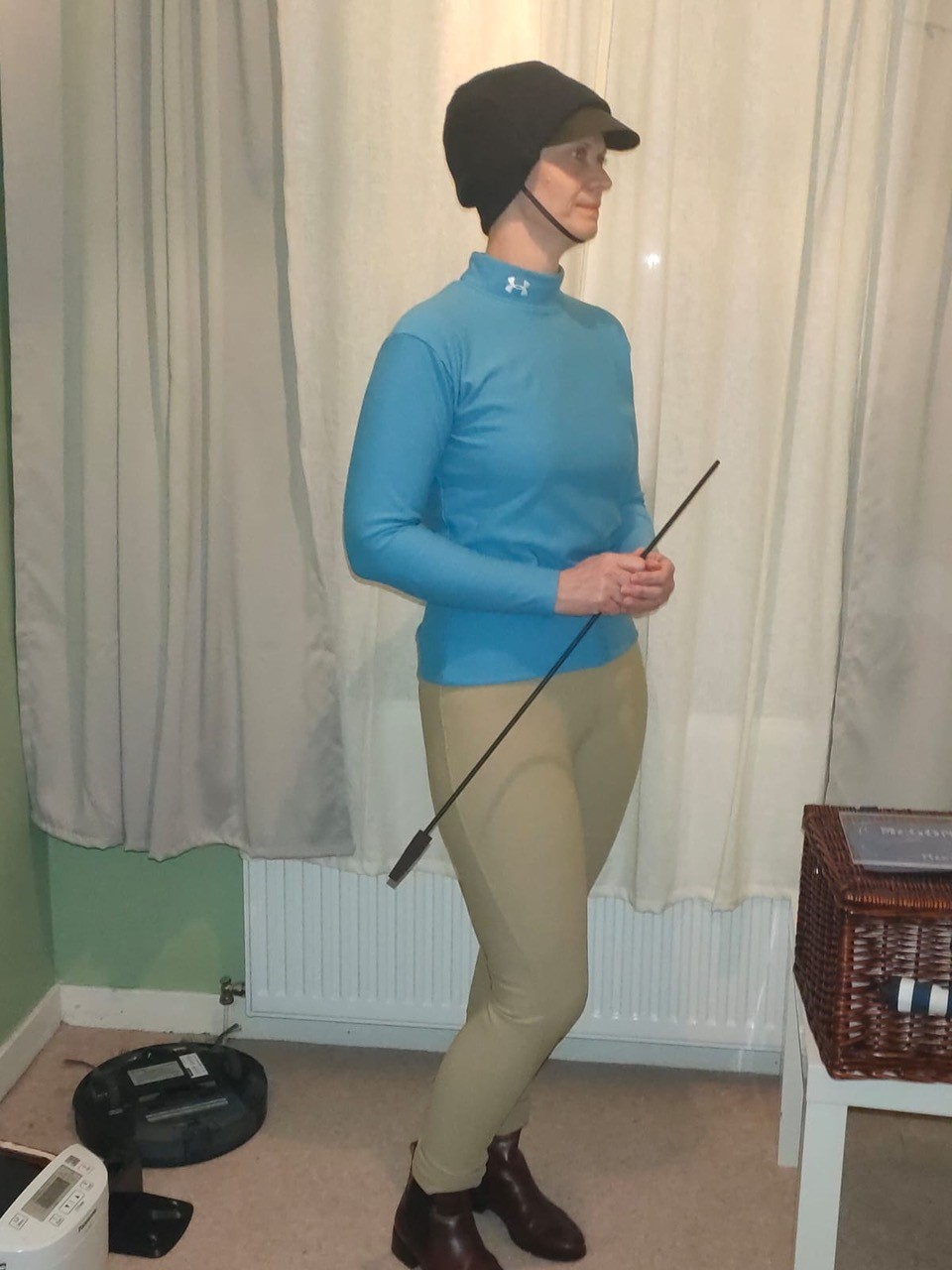
|
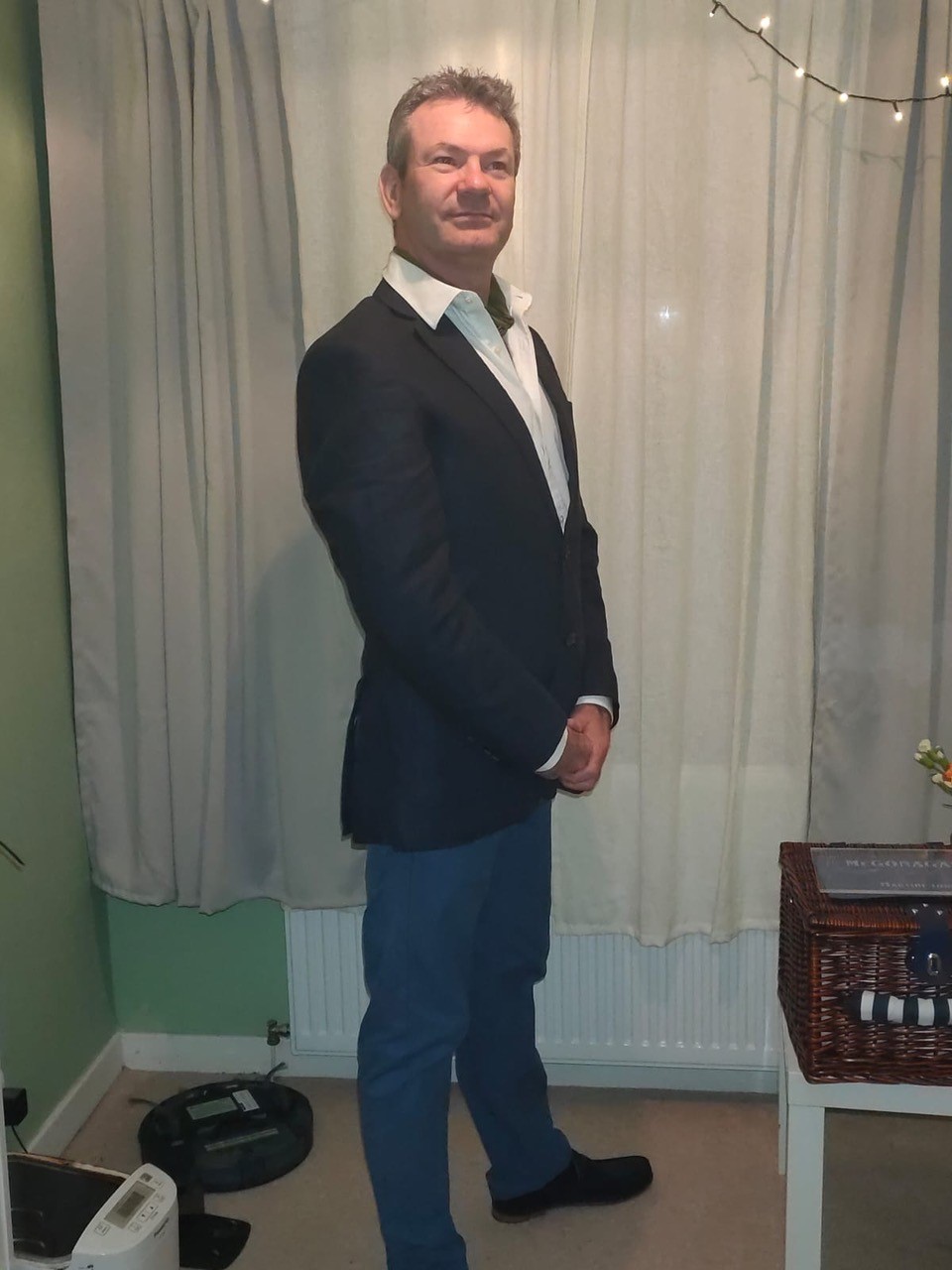
|
|
The fancy dress² Cocktail Hour |
|
As is now tradition the group began to gather as 7 pm approached, and first to join us was Declan. This was also a bit of a tradition as Declan was not adverse to helping out, or being the “tester” for the first round of cocktails.
Soon we were joined by our organiser of the day Anna, and if ever anyone deserved a drink it was she. Especially as she looked as she had taken a rather nasty fall!
Busying myself at the prepping for the first “follow along mixing” it was very interesting listening to Anna and Declan chatting away, I almost felt like a bartender!
This reverie was soon disturbed by a naughty equine obsessed young girl who refused to wash her hands.
Deciding that now was probably a good time for a stiff drink Martinis were mixed and glasses raised in a “Here’s to crime!” toast.
In true Convention form, the party continued beyond the Cocktail Party. Despite not being able to sit down to dinner together, a number of participants continued the Zoom marathon late into the evening, giving Jim D. an opportunity to call in from America.
Approximately 11 hours after the Zoom meeting was initiated, the final Conventioneers logged off, but only after we’d agreed to hold another Zoom call around the festive season.
CB, AM & KG.
January.2021
¹ Subject to further collation
² Fancy dress being optional !
This page last updated Copyright © 2002-2006 Bob Rothwell. 2007-2026 Charles Beck.